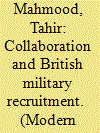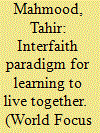| Srl | Item |
| 1 |
ID:
146836


|
|
|
|
|
| Summary/Abstract |
This article examines the ways in which rural elite collaborators mobilized recruits for the British Army during the First World War. It thus not only increases knowledge of Punjab's military history, but adds to the understanding of collaboration as a process involving competitive groups in which elites manipulated the process for their own ends. The case study material drawn from the Shahpur district of the colonial Punjab argues that while there may have been a degree of indoctrination into the colonial state's values, it was mainly the desire to use its patronage to bolster family influence or to transform local hierarchies that was the key factor in securing willing collaborators. The competition for local power and influence provided a local dynamic to the collaborative process. The state could of course take advantage of this competition to serve its interests, just as the Punjabi tribal chiefs could utilize state patronage to beat off rivals to their power. Collaboration was thus a dynamic two-way process, rather than, as it is often portrayed, a top-down, one-way relationship.
|
|
|
|
|
|
|
|
|
|
|
|
|
|
|
|
| 2 |
ID:
130788


|
|
|
|
|
| Publication |
2014.
|
| Summary/Abstract |
Man has always lived, and its still living, under two parallel social control mechanism - religion and law - and guidance for all aspects of human life is found in one or the other of these, often in both. Both are equally significant. Paradigmatic precepts teaching people how to live together in peace and harmony despite their different religious affiliations are found both in the age-old faith traditions and the national and international laws of time. I will briefly sample here relevant provisions of both but, being a law-man ignoramus in matters of religion, will begin with law.
|
|
|
|
|
|
|
|
|
|
|
|
|
|
|
|